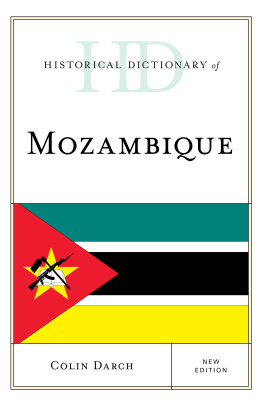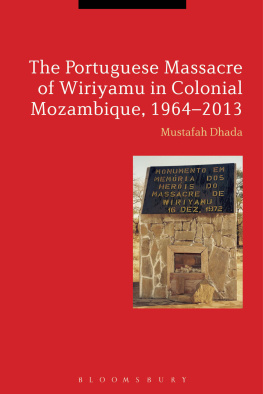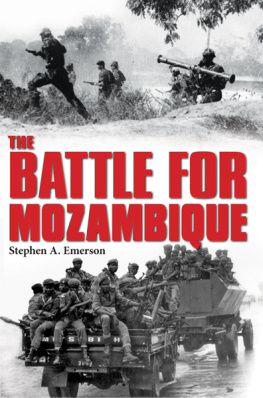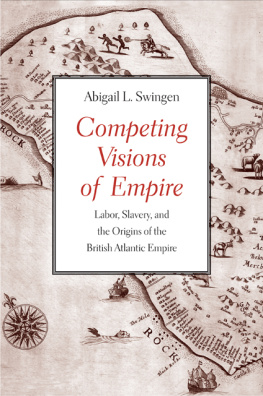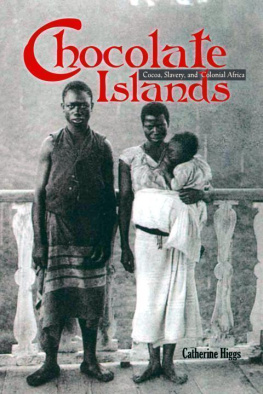University of Virginia Press
2012 by Eric Allina
All rights reserved
Printed in the United States of America on acid-free paper
First published 2012
1 3 5 7 9 8 6 4 2
Library of Congress Cataloging-in-Publication Data Allina-Pisano, Eric.
Slavery by any other name : African life under company rule in colonial Mozambique / Eric Allina.
p. cm. (Reconsiderations in southern African history)
Includes bibliographical references and index.
ISBN 978-0-8139-3272-9 (cloth : alk. paper) ISBN 978-0-8139-3275-0 (e-book)
1. Forced laborMozambiqueHistory. 2. MozambiqueHistory18911975. 3. MozambiqueEconomic conditionsTo 1975. 4. PortugalColoniesAfricaAdministration. 5. Labor policyMozambiqueHistory. 6. Companhia de MoambiqueHistory. I. Title. II. Series: Reconsiderations in southern African history.
HD4875.M85A45 2012
331.117309679dc23
2011032979
Illustration Credits: Maps 1 and 2, Michael Southern; illustration gallery pp. 19, Arquivo Histrico de Moambique; illustration gallery p. 10, Biblioteca Nacional, Portugal.
Preface
Teaching English in western Kenya more than twenty years ago, I encountered for the first time a hundred-year old belief about race and work in Africa. Michael Lubale, a seventeen-year-old Kenyan, showing me the building site for his future house, explained that he would soon reach the age to move out of the dwelling he shared with his younger brothers and into his own on the family compound. I offered to lend a hand in construction, and with a mischievous smile, Michael looked at me and asked, Can mzungu dig? I soon learned that, notwithstanding the smile he flashed, his question was a sober one, for I lacked the knowledge and ability to engage competently in many tasks that might be called unskilled labor, including the vital matter of hauling water. I still like to think Michaels question reflected his general beliefs of wazungu (Kiswahili for non-Africans or, sometimes, whites in particular), rather than a specific assessment of my capabilities.
Since then, as the focus of my scholarly work shifted from the present to the past, I have come to understand how attitude as much as ability figures in the history of work in twentieth-century colonial Africa. Europeans believed, or at least claimed to believe, that physical labor in tropical climes was beyond their capacity, one justification for having Africans take on, almost in its entirety, the physical task of transforming the continent into an outpost of empire. Over the past twenty years I have continued to observe Africans skepticism, sometimes well founded, about whites capacity for manual labor. I hope the story told here goes a little way toward answering Michaels question.
I could not have learned this story or written this book without the extensive documentation from the Mozambique Companys long-lost archives, held in Maputo at the Arquivo Histrico de Moambique. The company archivesgenerated by the private chartered company that governed the central Mozambican provinces of Manica and Sofala with near sovereign authority from 1892 to 1942countless stacks of files with millions of pages, documenting Portugals initial conquest, its policies, and its mundane daily operations, spent the decades after 1942 in a mysterious limbo. When the companys charter ended that year, the archives were packed into zinc-lined wooden crates and stored in a warehouse at the Indian Ocean port of Beira to await the sea voyage to Portugal. For reasons unknown, the crates remained in that port warehouse for the next thirty-five years, lost and, mostly, forgotten. There they found several locked outbuildings locals said had been shut up for years, their contents and the whereabouts of the keys unknown. They forced open the locked doors, and there were the long-lost archives.
The director of the archives, faced with the formidable task of tabulating, logging, and organizing the contents of several thousand boxes to create an inventory, placed the material under embargo until that work could be accomplished. A foreign scholar in Mozambique at the time, hoping to conduct research on the company, was denied access and could report only on reputedly extensive holdings. Not until the mid-1990s, when my own research for Slavery by Any Other Name began, did the entire contents of the crates become accessible for scholarly use. This book is the first to make use of that long-lost trove, a singular lode documenting the Mozambique Companys comprehensive, and often brutal, system of forced labor, more extensive and longer-lasting than nearly any other in colonial Africa.
Although the noncorrosive zinc lining of the crates in which the documents rested for decades before relocation to the more controlled archival environment had protected them from moisture and pests, some reports, maps, correspondence, and memos showed the ravages of time. In the 1890s and early 1900s, some company officials wrote with quill or nibbed pens on tissuelike paper; a century later, the centers of their pen strokes had fallen out of the paper. Working in sometimes dimly lit reading rooms, I deciphered these documents best by holding them up to let the light stream through to illuminate the now hollowed-out letters. Perusal was easier for later papers since, by 1910, most officials, except in outlying backwater districts, had typewriters. On some reports that had made their way up the administrative hierarchy, successive readers had scrawled comments directly on the text, hard to read but providing useful information on the response of readers on the documents journey. In these vast holdings I uncovered records of work gangs and wizards (colonial officials sometime name for indigenous healers), of river dredging and rumors of rebellion, and other extensive documentations of the regime of colonialism in central Mozambique.
There are some figures whose ongoing and important presence in the narrative told here begs for biographical treatment, but details on individuals are often hard to uncover. This is true almost as much for some Europeans as for Africans; while the backgrounds of personalities well known in other contexts, such as Gungunhana, Edward Ross, or Joaqum Carlos Paiva de Andrada, can be easily fleshed out, such information for others is more elusive. The difficulty is most acute for many Africans, who, in documentary sources, are usually identified only by a first name and perhaps by district of origin, but the same is the case for the companys minor employees. One of the companys more intriguing personalities was Jos Luiz Ferreira, who served as district administrator in Moribane for the better part of two decades and was a persistent critic of company labor policy, presenting trenchant and principled critiques of forced labor, a self-confessed negrophile and proud of it. Unfortunately, however, I know only his name, which, while not quite as common as John Smith (Andrew Jones might be closer), does not help in tracing origins, which might explain his critiques.
The biographies of some company officials, such as Joo Pery de Lind, are more easily explored. Educated at the prestigious Colgio Militar, Pery de Lind was a senior official in Portugals customs service when the company tapped him in 1900 to develop its customs regime. Six years later he became district administrator in Manica and, amid conflict between white settlers and the company governor in 1910, assumed the governorship when the sitting governor fled the territory. His eleven-year mandate as governor was the longest of any, and the hallmark of his administration was a near unflagging support for the largely Portuguese white farming community, centered in Manica and Chimoio. The sentiment was mutual, for the farmers have been said to have demanded that the district center be named for him, as it was, going by Vila Pery de Lind from the mid-1920s until independence in 1975. As much as Pery de Linds origins explain his role, it is more or less what one might expect, because Portugals aristocratic elite were almost invariably fervent supporters of its empire. On the other hand, the actions of a figure such as Ferreira are less easily explained and would make for a more unusual and engaging story that unfortunately cannot be told.


